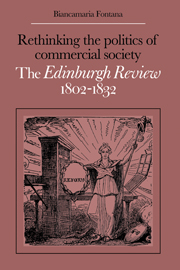Book contents
- Frontmatter
- Contents
- Preface
- Introduction
- 1 Scottish theories of commercial society and the French revolution
- 2 Adam Smith's heritage: the Edinburgh reviewers and the Wealth of Nations
- 3 The definition of political economy: political economy as a social science
- 4 The Edinburgh reviewers and the Whig party
- 5 Commercial society and its enemies: the debate on the First Reform Bill
- Conclusion
- Notes
- Bibliography
- Index
3 - The definition of political economy: political economy as a social science
Published online by Cambridge University Press: 14 January 2010
- Frontmatter
- Contents
- Preface
- Introduction
- 1 Scottish theories of commercial society and the French revolution
- 2 Adam Smith's heritage: the Edinburgh reviewers and the Wealth of Nations
- 3 The definition of political economy: political economy as a social science
- 4 The Edinburgh reviewers and the Whig party
- 5 Commercial society and its enemies: the debate on the First Reform Bill
- Conclusion
- Notes
- Bibliography
- Index
Summary
The Edinburgh Review and the ‘transition’ to English classical political economy
In the previous chapter we considered the changing content of Smithian economic theory throughout the years of the French war. It is now time to focus more specifically on what the Edinburgh reviewers thought of the nature of political economy as a discipline, and especially of its relations with political science as a whole.
Like their mentor Dugald Stewart, the reviewers were keenly interested in the problem of the nature of scientific knowledge and in the philosophy of the moral sciences. It would make little sense to discuss the influence of Hume, Smith and Stewart on English classical political economy, or the acquisition of a monopoly of economic knowledge on the part of the young Scottish Whigs, without considering the degree to which the Scottish project for a scientific understanding of politics and society carried over into 19th-century English culture.
In particular, the current assumption that the general science of society outlined by the writers of the Scottish Enlightenment gave birth at the beginning of the 19th century to a series of separate scientific disciplines is both highly influential and inordinately vague, and it deserves closer – and more historically minded – attention.
Previous scholarship, particularly in the history of economic thought, has largely ignored the contribution which the reviewers made to the definition of the nature and method of political economy – both their popularisation of Dugald Stewart's ideas and their own original speculations on the subject.
- Type
- Chapter
- Information
- Rethinking the Politics of Commercial SocietyThe Edinburgh Review 1802–1832, pp. 79 - 111Publisher: Cambridge University PressPrint publication year: 1985

